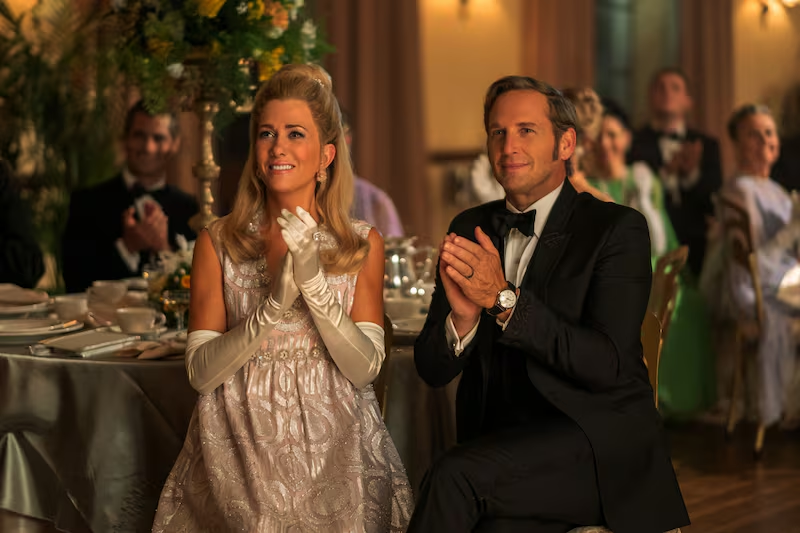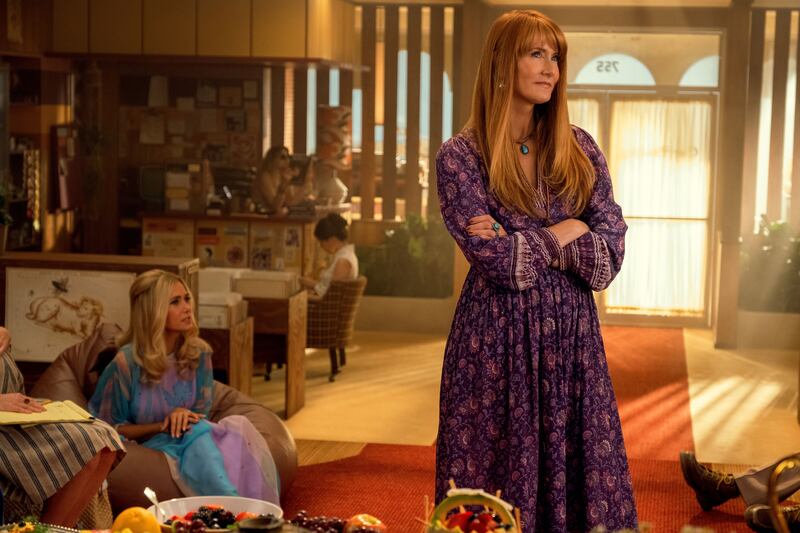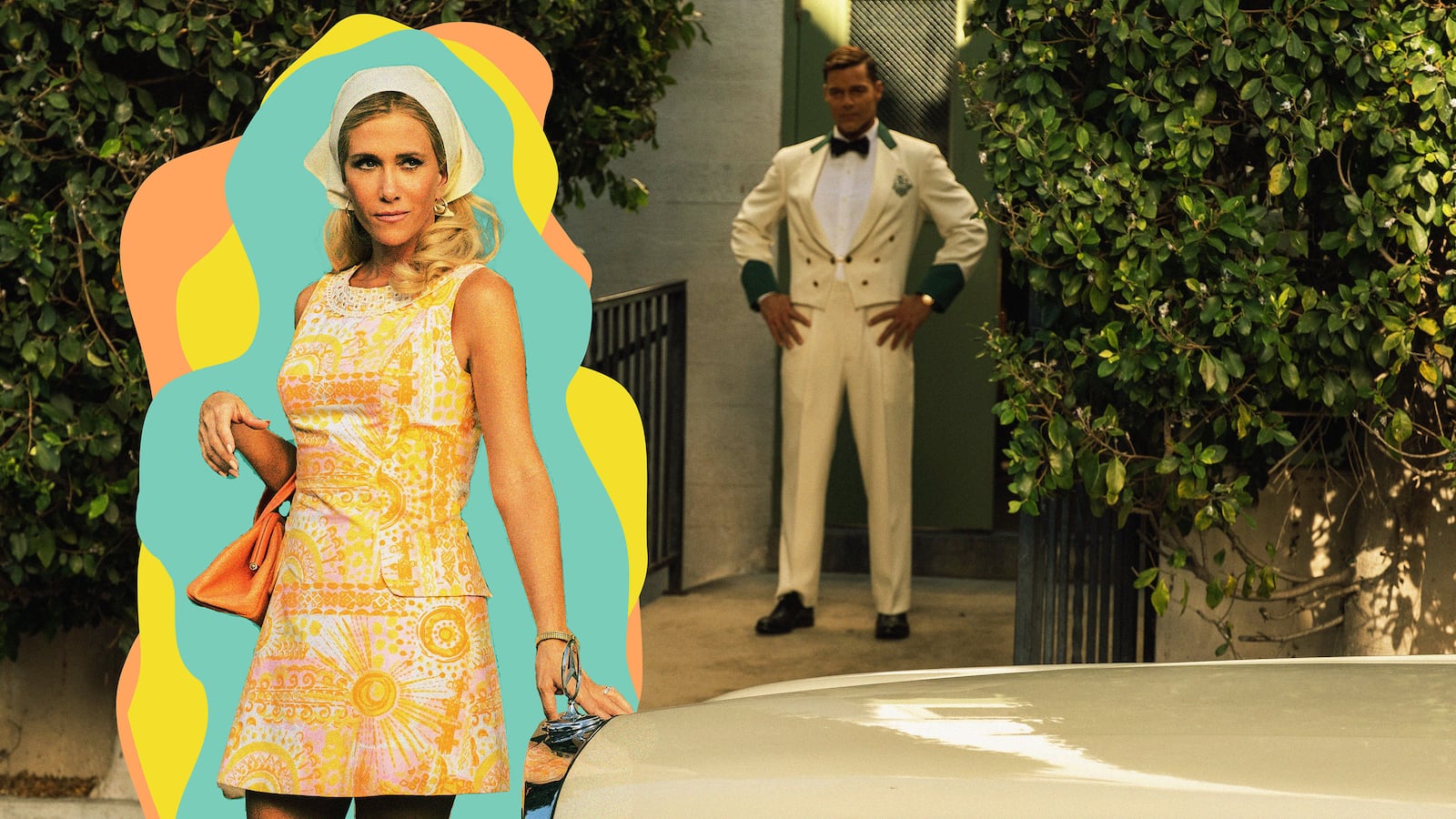What’s the deal with Florida these days? It seems like everyone is migrating to the Sunshine State—and specifically Palm Beach—for a little vacation. There was Annette Bening in her rotten new limited series, RHONY star Tinsley Mortimer for her long-awaited fairytale wedding, and, of course, Donald Trump for the annual barnacle-boiling convention known as the Mar-a-Lago New Year’s Eve party. Deny it all you want, but Palm Beach is having a moment.
Now, allow Kristen Wiig and a crew of consummate costars to elaborate on why this spring break destination is becoming so popular again. In the new series Palm Royale, which premieres on Apple TV+ Mar. 20, Wiig plays a woman with big ambitions and little money who is determined to break into the Palm Beach social scene in 1969. And while tales of enterprising strivers aren’t exactly new, the show finds plenty of innovation in its sun-drenched setting, letting Florida’s newcomers and its fully blossomed biddies go at it in pursuit of meaningless power. While its side narratives about the burgeoning women’s rights movement fall flatter, Palm Royale has enough Aqua Net and quaaludes to buoy the series. A bewitching performance by Wiig ties the whole affair together in one big discount store bow.
With Wiig onboard, one might expect Palm Royale to be a larger-than-life, laugh-a-minute satire. While that sardonic quality is certainly there, the series is flavored more like a fluffy dramedy, which ultimately works in its favor. Wiig plays Maxine Simmons, aka Maxine Dellacorte, wife of the last remaining son of the Dellacorte dynasty, a family whose name is synonymous with Palm Beach wealth. Her husband, Douglas (Josh Lucas), is estranged from his relatives, meaning that Maxine’s only shot at getting a chunk of the inheritance is to ingratiate herself into the society where Norma Dellacorte (Carol Burnett), Douglas’ aunt, is still revered as queen supreme.

To make a name for herself, Maxine has infiltrated the walls of the Palm Royale—the most prestigious private club in all of Florida—which she does quite literally by hoisting herself up and over the club’s stone fences. Maxine is instantly a made woman, tossed out on her sheath-dressed behind by the Palm Royale’s waiter-turned-bouncer, Robert (a ridiculously seductive Ricky Martin). But Maxine isn’t just after the money, she genuinely wants to be a part of the lavish lifestyle maintained by the Palm Royale’s members. For her, it’s about finally belonging somewhere. And Maxine will do anything to fit in, scheming to manipulate notable club members like Dinah (Leslie Bibb), Mary (Julia Duffy), and the all-powerful Evelyn (Allison Janney) to sponsor her induction into their exclusive clique.
It’s great fun to watch the ways Maxine flits in and out of her ever-changing social standing, panicking each time she loses a little bit of status. The rank of every Palm Beach socialite is determined by the local paper, the Shiny Sheet, which residents live and die by. Wiig is excellent at balancing Maxine’s tenacity with her persistent anxiety, grabbing the morning issue of the Shiny Sheet like it’s a judge’s verdict and she’s on trial in the court of public opinion. Wiig keeps that apprehension just below the surface, suggesting that Maxine might spiral at any moment. Hell, even when her character accidentally does something right for once, it often comes with unexpected repercussions to dance around.
Wiig is an asset to Palm Royale, given that the show’s writing leaves something to be desired. It’s not quite as funny as it could be, and there are occasional pockets of dead air where an off-the-cuff character remark or a little physical gag could easily punch up the material. But Wiig is so skilled that she holds the frame and makes something funny even when there’s nothing overtly comical happening. No one can inhabit a character like Wiig—especially one as subtly layered as Maxine—and Palm Royale is a testament to just how far her singular physicality and timing can take a series. And though the show does hit an occasional rhythmic snag, it settles back into its groove nicely and without too much obvious rejiggering. Like Maxine, you can never let them see you sweat!
But who are we kidding? Even if the pacing can feel a little odd, Palm Royale makes up for it with its star-studded cast of women. They’re who audiences will flock to this show for, and for good reason: The choice of actors is phenomenal. Palm Royale contains an assemblage of actors that, had this show been released in 2014, would have been the only thing anyone talked about for months. Why Apple TV+ isn’t buying up oodles of ad space during Drag Race commercial breaks is beyond me; this is a cast that was designed by gay scientists (which are just gay guys who have googled what the acronym for PrEP stands for too many times to count) for maximum impact on the minds of homosexual men and straight women.
But the show doesn’t just gather a slew of big names together and plop them into a scene, hoping that melange will be enough to make the series a decent one. Rather, the casting is thoughtful and a delight to watch come together, with each character feeling like they’re played by the exact right actor. I am particularly charmed by the inclusion of Mindy Cohn as a new society editor at the Shiny Sheet, often wearing a Velma Dinkley bob wig and big glasses, which almost seem like a nod at Cohn voicing the famous teenage sleuth for so many years.

It’s that kind of consideration that helps Palm Royale transcend its occasional shakiness. There are some blatantly obvious shots of Wiig and co. walking toward green screens, dressed up to look like swanky Palm Beach exteriors; the costumes, though beautiful and elegantly constructed, are a bit one-note and not entirely character-specific; and that aforementioned side plot about the women’s rights movement takes too long to pay off. Though, Laura Dern, who plays one of the group’s leaders, Linda, is a fabulous addition to an already stacked cast. Palm Royale is almost scarily good at offsetting all of its minor flaws. There’s always something sweet waiting around the corner.
The series is a fun, fresh take on the garden-variety outsider-looking-in tale. Palm Royale asks some interesting questions about what women have to do to get a seat at the table, and how some are shut out entirely because of race or economic status, unable to even reach Maxine’s starting point. Those questions don’t always have answers, but watching the writers work through them is at least compelling and always enjoyable, which is more than can be said for quite a few series these days, no matter how many notable names are on the call sheet. Like the titular, fictional club, Palm Royale will be one show that you can’t help but want to keep coming back to, even if it’s just to see what the kooks down in Florida are up to next.
This story has been updated to correct that Carol Burnett’s character is Douglas’ aunt.






